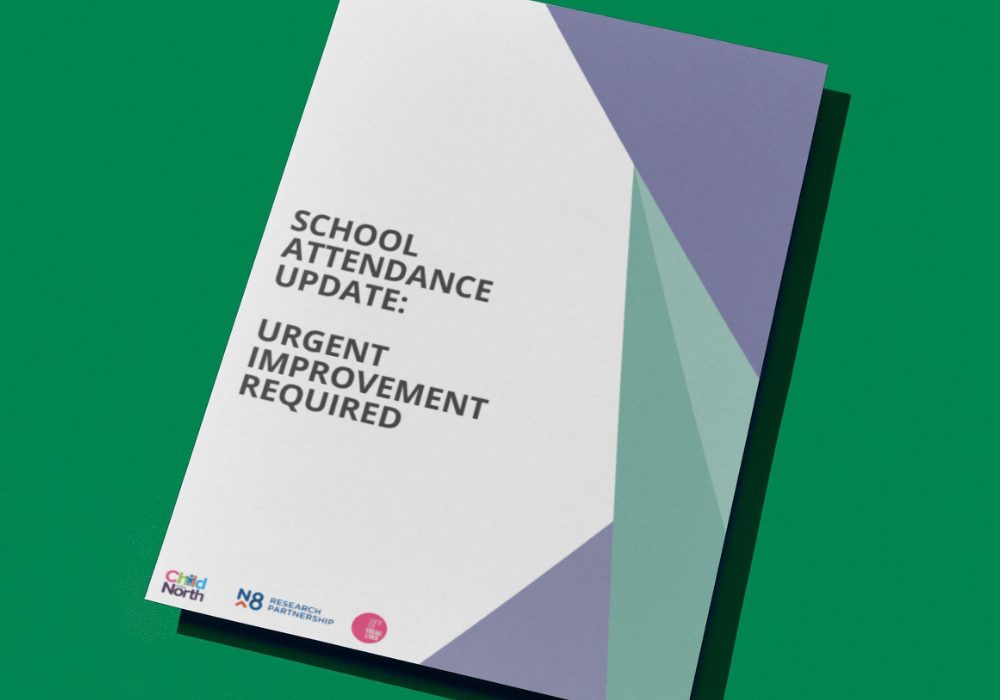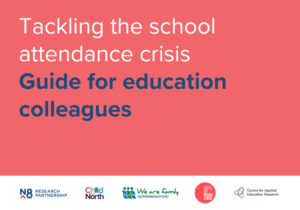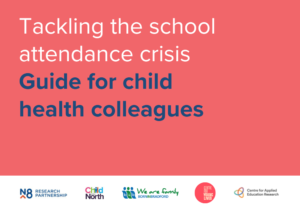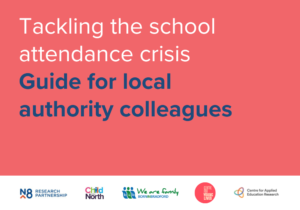Improving school attendance
For a country that works for all children and young people.
We are calling on the government to put children first. Our 2024 report series provides evidence-based plans and recommendations on how to improve outcomes for children and young people in the North of England and beyond. Published alongside 2025 report updates, new practitioner toolkits have been designed to support schools, child health services, and local authorities to implement the report recommendations and put children first. #ChildrenFirst
Produced jointly by Child of the North and the Centre for Young Lives the tenth report in the Child of the North 2024/25 campaign series puts forward new recommendations to tackle the school absence crisis.
First published in October 2024, An evidence-based plan for improving school attendance, highlights how vulnerable children and children from disadvantaged areas of the UK (such as the North of England) are at higher risk of not being in school, and calls on the new Government to focus its school absence strategy on earlier identification and intervention with children most at risk of persistent absence.
An update School attendance update: Urgent improvement required, released in November 2025, highlights how the crisis remains with inequalities related to poverty and disadvantage becoming entrenched. This is the tenth update in our twelve-week #ChildrenFirst campaign, and is accompanied by the release of toolkits designed to support schools, child health services and local authorities to implement expert recommendations and improve outcomes for all children.
We need the government, policymakers, practitioners, academics, communities and young people to work together to build a country that works for all children and young people.
How To Guides
A series of toolkits have been developed to help practitioners and organisations take practical steps to improve the health and wellbeing of the children and young people with whom they work directly. Building on the findings of the Child of the North reports, these ‘How To’ guides provide evidence and suggestions about how all parties can work together.
Webinar
In October 2024 a number of the report’s authors came together to discuss the report’s findings and policy recommendations, including:
- Caroline Bond & Pamela Qualter (University of Manchester)
- Anna Wallace (Bradford SAFE Taskforce)
- Matthew Fletcher (Wirral Educational Psychology Service)
- Sean Harris (Tees Valley Education)
Anne Longfield, Executive Chair of the Centre for Young Lives, said:
“Tackling the rise in children missing learning is one of the Government’s most urgent challenges. We should be extremely concerned that 150,000 children are absent from school for half or more of the academic year. This is bad for their life chances and bad for our economy and society.
“The reasons why children miss school are often complex and there is no silver bullet. However, the one-size-fits-all and often punitive approach that previous Governments have taken to tackle absence needs to be consigned to the past. Simply, threatening parents with fines is not working for many families and not reducing severe absence rates.
“The crucial message this report puts forward is the need to intervene early and to build a sense of belonging and inclusion in schools. Investing early in supporting children at risk of disengagement from education is the best way of preventing problems further down the line and no child should ever think that school isn’t for them.
“The Department for Education is right to have school absence near the top of its task list. Boosting programmes and projects that support all children to learn is vital if Ministers are to realise their core mission of breaking down the barriers to opportunity.”
Professor Mark Mon Williams, Child of The North report series editor, said:
“The crisis in school attendance goes beyond numbers – it represents the life chances of thousands of children. When children are not in school, they are not just missing lessons; they are at risk of potential danger, and they are losing opportunities for healthy development.
“We urgently need to create an education system that identifies and supports children at risk of disengagement before they fall behind, so every child has the chance to succeed, no matter their background.
“The UK’s future depends on everyone supporting schools to be inclusive places where all children and young people feel they belong.”
Dr Camilla Kingdon, Former President of the Royal College of Paediatrics and Child Health, said:
“I find the data presented in this report terrifying. I am struck not just by the simple enormity of how many children are not in school, but the clear evidence of how unfair this is. Why should a child who lives in the North of England be at significantly higher risk of disengaging with the education system? How can it be that a child on free school meals is so much more likely to persistently miss school? Why are young carers finding it so difficult to engage with full time education?
“Each of these groups represents part of our future and we cannot let them down in the ways described in this report. The solutions are complex but time is of the essence and I commend the policy recommendations laid out in this 10th report from Centre for Young Lives/Child of the North.”
Professor Caroline Bond, University of Manchester, one of the executive report editors, said:
“School attendance is a critical issue, not just for academic achievement but for the overall wellbeing and success of young people. It is essential that we work together—schools, families, communities, services and policymakers—to ensure that every child is able to engage with high quality education.”
Sign up for updates on our 2024/25 Campaign
We will only use this data for the purposes of providing updates on the Child of the North 2024/25 campaign and report series. For more information see the Privacy Policy at https://www.sheffield.ac.uk/privacy
Previous Reports
Previous reports can be found archived on our Child of the North Reports page.
Contact Us
Stephen Parkinson, Research Partnership Manager
***








